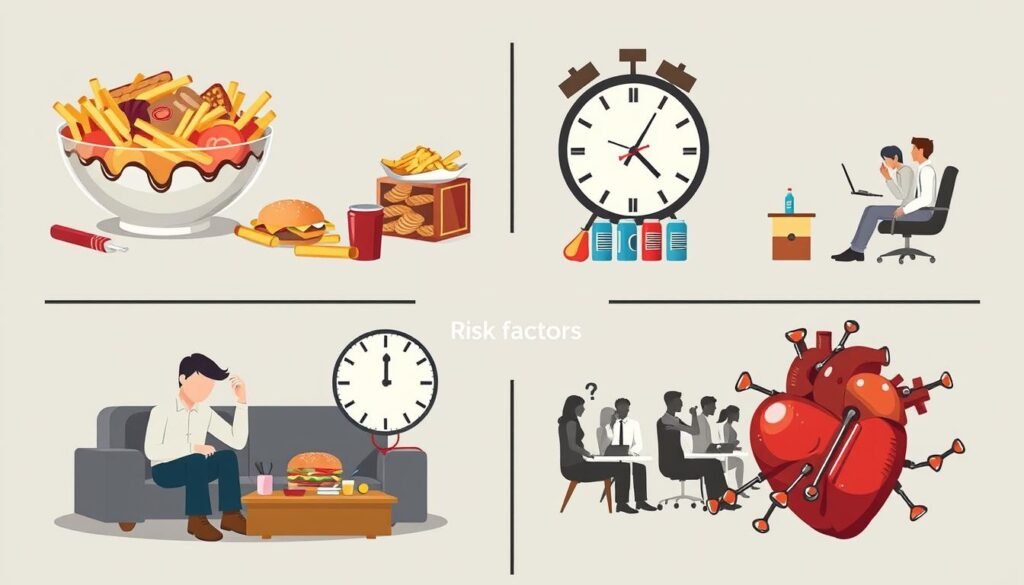Did you know high stress can triple your risk of high cholesterol? This rise in heart disease risk links closely to chronic stress. It’s because stress makes your body release hormones that mess with your cholesterol.
By facing stress head-on, we can better manage our cholesterol. Leading a healthy lifestyle can help keep your heart strong. This guide explores how to achieve that.
Key Takeaways
- Stress significantly affects cholesterol levels, elevating LDL and lowering HDL.
- Chronic stress can lead to long-term high cholesterol due to cortisol levels.
- Lifestyle modifications, including diet and exercise, can mitigate stress effects on cholesterol.
- Stress-induced inflammation may increase lipid levels and contribute to obesity.
- Stress management techniques, such as mindfulness, can improve heart health.
Overview of Cholesterol and Its Types
Cholesterol is important for our bodies. It is made mainly by the liver and also comes from some foods. Knowing about different types of cholesterol and their impact is vital for our heart health. High or low cholesterol levels can cause health problems.
What is Cholesterol?
Cholesterol is a waxy substance in our cells. It helps make hormones and vitamin D. There are different types, including LDL and HDL cholesterol. Keeping these levels balanced is key to staying healthy.
Types of Cholesterol: HDL vs. LDL
Cholesterol comes in several forms. LDL cholesterol is called “bad” because it can clog arteries. This can lead to heart disease or heart attacks. HDL, known as “good” cholesterol, helps clear cholesterol from the blood. This lowers the risk of heart disease.
Importance of Cholesterol Levels in Heart Health
Total cholesterol, which includes HDL and LDL, shows if your heart is healthy. The American Heart Association suggests keeping LDL under 100 mg/dL and HDL over 60 mg/dL. Testing cholesterol helps us know our health risks and when to change our lifestyle.
| Cholesterol Type | Common Name | Impact on Health |
|---|---|---|
| LDL | Bad Cholesterol | Increases plaque buildup in arteries, raising heart disease risk |
| HDL | Good Cholesterol | Helps remove cholesterol from arteries, reducing heart disease risk |
How Stress Affects the Body
Stress impacts our bodies differently based on its duration. Short-term, or acute, stress boosts focus and can up performance in tough times. Conversely, long-lasting stress harms our health more deeply. It causes our bodies to continually release stress hormones.
This means our heart rate and blood pressure can stay high. Over time, too much cortisol can lead to serious health issues like higher cholesterol and a greater risk of heart disease.
Immediate vs. Chronic Stress
Short-term stress gives us a quick energy spike. It’s that rush we feel in critical moments, often called adrenaline response. However, this is much different from long-term stress’s effect.
Long-term stress keeps our bodies on edge too long, causing harm. Problems like anxiety and high cholesterol can arise because of constant stress hormones.
Hormonal Responses: Adrenaline and Cortisol
The way stress hormones affect us is crucial. Adrenaline and cortisol, when high for too long, damage our health. They mess up our cholesterol levels — increasing bad (LDL) and decreasing good (HDL) cholesterol. This could mean a higher risk for heart problems.
But, by exercising regularly and eating right, we can fight these stress effects. Interested in how to handle stress better? Look at these stress management strategies.

The Connection Between Stress and Cholesterol
It’s vital to understand how stress and cholesterol are connected for heart health. Studies show stress affects cholesterol levels, mainly through cortisol’s action. Knowing how to manage stress is key for good health.
Research Findings on Stress and Cholesterol Levels
Many studies have found that stress can worsen cholesterol levels. It increases bad LDL cholesterol and lowers good HDL cholesterol. Things like social isolation, heavy workloads, money worries, and even racism can increase stress. This not only hurts our mental health but also raises the risk of heart disease by messing with cholesterol.
The Role of Cortisol in Cholesterol Regulation
Cortisol is a hormone that goes up when we’re stressed. It’s closely involved in controlling cholesterol. High cortisol can cause inflammation, which is related to heart risks like high blood pressure and hardening of the arteries. This shows how ongoing stress can negatively affect cholesterol levels over time.
Long-term Effects of Stress on Lipid Profiles
The impact of long-term stress on cholesterol can be significant. Constant stress changes how our bodies work, leading to higher cholesterol. This greatly boosts the risk of heart disease. Managing stress is crucial for keeping cholesterol levels in check and supporting heart health.
| Stress Factor | Effect on Cholesterol Levels | Heart Health Implications |
|---|---|---|
| Chronic Stress | Increases LDL cholesterol, decreases HDL cholesterol | Higher risk of heart disease |
| Cortisol Production | Contributes to inflammation and higher cholesterol | Enhances risk of atherosclerosis |
| Unhealthy Coping Mechanisms | Leads to poor diet choices and inactivity | Increased risk of obesity and heart disease |
| Social Isolation | Heightens stress levels, worsening lipid profiles | Increases risk of heart complications |
Risk Factors Associated with High Cholesterol
Understanding the risk factors for high cholesterol is very important. Many things can make cholesterol levels go up. This includes how we live and our genetics. Health conditions can also make it worse.
Impact of Lifestyle Choices on Cholesterol
How we live has a big effect on cholesterol risk. Eating too much saturated fat can raise “bad” LDL cholesterol. Drinking a lot of alcohol also raises cholesterol levels.
Smoking is another risk. It decreases good HDL cholesterol, especially in women. It makes LDL cholesterol go up too.
Genetic Factors and Family History
Genes play a big role in cholesterol levels. If your family has heart problems, you might have cholesterol issues too. Some people have genetic mutations that make removing LDL cholesterol hard. This condition is more common in certain groups.
Additional Health Conditions to Consider
Some health issues affect cholesterol too. Diseases like lupus and HIV can increase cholesterol levels. Being very overweight also increases risk. It’s very important to check your cholesterol regularly if you are over 40.

| Risk Factor | Impact on Cholesterol |
|---|---|
| Saturated Fats | Raises LDL cholesterol levels |
| Alcohol Consumption | Increases total cholesterol; overconsumption is harmful |
| Smoking | Lowers HDL cholesterol; raises LDL cholesterol |
| Lack of Physical Activity | Linked to unhealthy cholesterol levels |
| Genetic Factors | Increased susceptibility to high cholesterol |
| Health Conditions | Can interfere with cholesterol management |
Stress and Cholesterol: Evidence from Studies
Research shows there’s a strong link between stress and cholesterol levels. Work stress, especially, leads to higher cholesterol. Many studies prove that people with stressful jobs often have worse cholesterol than others.
Work-related Stress and Cholesterol Issues
In a study of 5,000 people, job stress greatly affected cholesterol levels. Over half of the high-stress group had too much cholesterol. The most stressed were 13 times more likely to have high cholesterol in three years.
Stress made LDL cholesterol levels spike four times higher in some. This was true for those facing a lot of job stress.
Studies on Young Adults and Stress
College students also struggle with stress and cholesterol. Their levels jump during exams. This shows that stress hits all ages, not just older people.
It’s vital for young people to learn how to manage stress early. This can help avoid cholesterol problems later on.

Effective Lifestyle Modifications to Manage Stress
Managing stress is key to keeping cholesterol levels healthy. Making certain lifestyle changes can boost well-being and heart health.
Dietary Changes for Better Cholesterol Control
Eating for a healthy heart means less saturated and trans fats. More fruits, veggies, whole grains, lean meats, and healthy oils are in. This diet helps manage cholesterol and stress. Foods high in fiber, like oats and beans, lower LDL cholesterol. Soy products also have cholesterol-lowering effects. Diet and exercise together combat high lipid levels in the blood.
Importance of Regular Exercise
Regular exercise is crucial for stress relief and cholesterol control. Aim for 150 minutes of moderate exercise each week. This lowers LDL cholesterol and blood pressure. Walking, jogging, or cycling boost heart health.
Daily exercise is a strong defense against chronic stress’s effects.
Mindfulness Techniques for Stress Reduction
Mindfulness, through meditation and yoga, helps manage stress. These practices reduce anxiety and lower cholesterol by fighting stress. Studies show they promote emotional well-being and lead to healthy life changes.
Adding these techniques to daily life builds resilience against stress.
Coping with Stress and Its Impact on Health
Managing stress is key to staying healthy. Learning how to handle stress well can lessen its bad effects on health. People often enjoy activities like writing in a journal, hanging out with friends, or helping in the community. These can make you feel better mentally. Adding these activities to your daily life helps you deal with stress better.
Establishing Healthy Coping Mechanisms
To deal with stress-related high cholesterol, it’s important to use positive strategies. Being active not only lowers stress but also helps with cholesterol. It does this by raising HDL (good) cholesterol and lowering LDL (bad) cholesterol. Eating healthy foods that are low in bad fats and high in fiber helps your heart. Learning to manage stress through deep breaths, meditation, and yoga is also great for your health.
Therapeutic Approaches for Stress Management
Professional therapy helps people find the cause of their stress and how to deal with it. It teaches better communication, positive thinking, and good habits. These skills are crucial for tackling stress and its effects on health. Having support from family and friends also helps. It makes people stronger emotionally and reduces stress.
Getting help for stress management is key for healthy cholesterol levels too.
For more info on stress and cholesterol, check out this resource.
Seeking Professional Help for Chronic Stress
Chronic stress affects health and well-being deeply. Knowing when to seek help is key to manage it. If it hurts your life, relationships, or work, talking to a doctor is important. They can offer tailored advice and strategies.
When to Consult a Healthcare Provider
People often wonder when to get help for stress. You should look for support if you:
- Persistently feel anxious or depressed.
- Can’t concentrate or handle daily tasks.
- Have headaches, muscle tension, or stomach issues.
- Avoid social activities or easily get angry.
- See big changes in your sleep or eating habits.
Potential Treatments for Anxiety Disorders
Treatment for stress and anxiety depends on what you need. Doctors usually suggest:
| Treatment Type | Description |
|---|---|
| Cognitive Behavioral Therapy (CBT) | A therapy focusing on changing negative thought patterns and behaviors. |
| Behavioral Therapy | Targets behavior changes, particularly for anxiety triggers and phobias. |
| Group Therapy | Provides support from peers experiencing similar stressors. |
| Medication | Prescribed by psychiatrists to manage symptoms of anxiety disorders. |
| Mindfulness Techniques | Include relaxation exercises, yoga, and meditation for holistic wellness. |
Choosing the right treatment involves trying different therapies. Emotional health is crucial. Professional support offers tools for stress management.
Conclusion
It’s crucial to understand how managing stress helps with cholesterol levels for a healthier heart. Stress raises cortisol, boosting blood cholesterol and creating heart issues. Making the right lifestyle choices, like regular exercise and mindful eating, positively changes cholesterol levels and wellbeing.
Having a strong support network also lowers stress and heart disease risks. People in high-stress jobs without much control might face greater heart disease risks. Adopting healthy ways to cope, such as exercising and spending time with friends, helps reduce stress and make better health choices.
Focusing on stress management and heart-healthy habits brings major long-term benefits. For tips on how diet and exercise help with cholesterol, check out this resource. Taking steps early makes managing cholesterol easier, improving overall heart health.